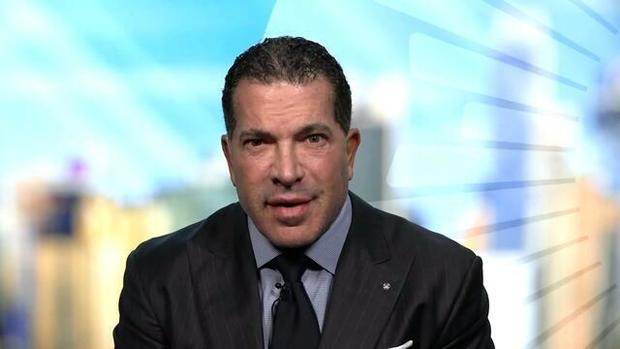Washington — Joe Tacopina, a lawyer for former President Donald Trump, argued Wednesday that “there was no scheme and there was no crime” committed in connection with hush money payments made before the 2016 presidential election.
In an interview with “CBS Mornings,” Tacopina defended Trump from allegations by New York prosecutors he orchestrated a years-long scheme with others to use the payments to suppress negative information before the 2016 election, asserting “there’s no crime at all.”
The former president was indicted by a Manhattan grand jury last week and on Tuesday pleaded not guilty to 34 felony counts of falsifying business records. New York prosecutors claim the scheme involved three payments made by Trump’s allies to hide damaging stories: $30,000 to a former Trump Tower doorman who claimed to have evidence that Trump fathered a child out of wedlock; $150,000 to a former Playboy model who said she had an affair with Trump; and $130,000 to adult film star Stormy Daniels, who also alleged an affair.
Trump has denied having affairs with the two women, and the company that paid the former doorman concluded his story was false.
“This is not a game,” Tacopina said. “You’re charging the president of the United States with crimes, crimes that will never be sustained in the court of law because they don’t exist.”
Tacopina criticized the indictment, unsealed Tuesday as Trump appeared in court for his arraignment, calling it “very vanilla.” He also questioned why Manhattan District Attorney Alvin Bragg didn’t list the underlying crimes the former president allegedly attempted to conceal by falsifying the business records, though Bragg was not required by law to do so.
Falsifying business records is typically a misdemeanor under New York law, but can be elevated to a felony if done with an “intent to defraud [that] includes an intent to commit another crime or to aid or conceal the commission thereof.”
Prosecutors claimed Trump’s actions were intended to violate state and federal election laws or hide those violations. But Tacopina said campaign money was not used to suppress bad stories before the election, as it was not a “campaign issue.”
“This was done to prevent an unpleasant story from coming out,” he said.
In addition to the indictment unsealed Tuesday, prosecutors also made public an accompanying statement of facts that provided more details about reimbursements for hush money payments made by Michael Cohen, Trump’s former lawyer and fixer. Cohen has said he paid Daniels to remain silent about her alleged affair with Trump and was reimbursed by the Trump Organization through payments classified as legal fees.
According to the statement of facts, the payment records maintained by the Trump Organization were “false New York business records,” as no retainer agreement existed, and Cohen was not being paid for legal services rendered in 2017.
Prosecutors described in the document how Trump Organization chief financial officer Allen Weisselberg and Cohen met in January 2017 to discuss how Cohen would be repaid for the money given to Daniels. The two agreed Cohen would receive $180,000 in total for the $130,000 hush money payment to her, and Weisselberg then doubled that amount to $360,000 so Cohen could characterize the payment as income on his tax returns. Cohen then would be left with $180,000 after paying roughly 50% in income taxes, according to the statement of facts. Weisselberg also added an additional $60,000 as a “supplemental year-end bonus,” prosecutors alleged.
The $420,000 was paid in monthly installments through 2017.
Asked whether Weisselberg could appear as a witness for the prosecution or defense, Tacipona said “in no scenario” will he testify for the prosecution.
“If you listen to his trial testimony, he all but exonerated Donald Trump in any knowledge of anything, he pled guilty to committing his own personal tax crimes,” he said.
Tacopina also defended Trump’s comments criticizing the New York judge overseeing the case, Judge Juan Merchan. The former president claimed in a speech to supporters Tuesday night that Merchan is a “Trump-hating judge with a Trump-hating wife and family.”
“It is an opinion of someone who has been out through a political persecution,” he said. “It’s not a fact — it’s an opinion of someone who has the right to feel aggrieved.”
